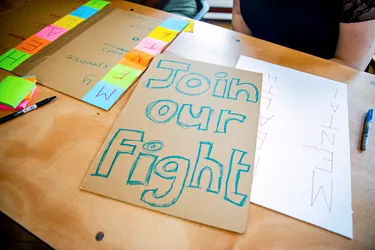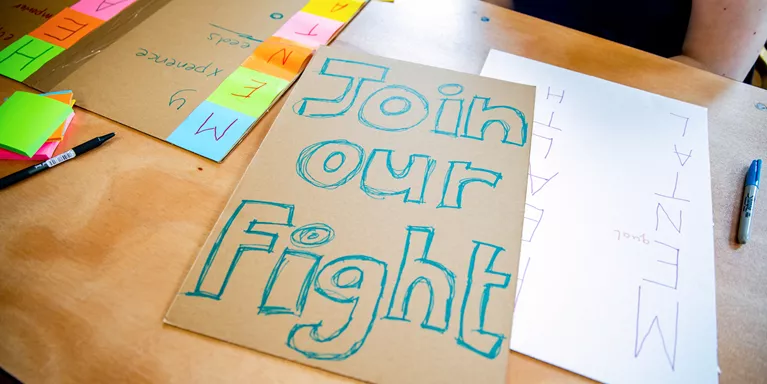Blogging, depression and my nan
Georgina blogs about opening up about her experience of depression on her blog, on Facebook and to her Nan
A 'like'! (Only one? But it’s been 20 minutes...oh God everyone else thinks I’m weird.) Two months later, and that blog I nervously posted to Facebook has had over 9,000 views, over 2,000 shares, and praise from charities and authors alike.
If I'd known that would be the response, I probably wouldn’t have posted it with a racing heart, churning stomach and sweaty palms. Publicly announcing that you’ve suffered from depression to your 500+ Facebook friends – when fewer than five of them had any idea – isn’t the norm, is it? But it’s been one of the best things I ever did.
June to November 2014 were the worst months of my life. Someone who got in touch and shared their own experience of depression with me – as many people have – described it as looking out at the world from inside a goldfish bowl. I have a catalogue of metaphors I could use to describe the soul-sucking hopelessness, but this is one of my favourites.
My blog post described my journey through depression; from falling in to clambering out, and what I clung onto that helped.
"I realised that the cloud had well and truly lifted, and that life had a permanent opening to stream in."
It was a euphoric feeling this year when I realised that the cloud had well and truly lifted, and that life had a permanent opening to stream in through. But however great (relieved, joyous, thankful) I felt, it saddened me that I'd never get those un-lived six months back. They were gone, wasted, irretrievable. That is, they were before I posted that blog.
Since that nerve-wracking moment in June, my heart and soul have been warmed by the overwhelming response: I’ve received hundreds of messages of thanks and support from friends, family, friends of friends, colleagues, ex-boyfriends, friends’ ex-boyfriends and complete strangers. Many people have told me that the article gave them hope, and those whose friends and family had been through it said that they finally understood.
To me, as well as being thankful to have helped so many people who were in the awful place I was (and I can't quite explain how much that means to me), that blog has given me back six months of my life. Because now they have some value and meaning. Now they have a purpose.
"The biggest shock was when my nan, who I have always been close to, revealed to me that she’d had therapy."
I'm proud to have contributed to the fight against stigma, and it was the people who told me that I'd totally changed their view on depression who made me feel that I really had made an impact. A work acquaintance told me how she struggled through in the sixties with no support whatsoever. But the biggest shock was when my nan, who I have always been close to, revealed to me that she’d had therapy when she went through a breakdown at 19: "I felt like I was dying."
My nan is 82, and in the 28 years on earth we've shared, I thought I knew all the important stuff. Because I haven't just heard about it once; those favourite stories have come up at every family gathering since they were born into existence. How my nan tripped on her way into a restaurant in Malta, then slid along the entire length of the restaurant floor, and how much mashed potato everyone used to eat on Boxing Day ("Mountains of it!" – your family's weird too, right?). But there were also sadder tales – cancer battles, family who were lost too soon – it wasn't all lark and mashed potato. But never, amongst family or just the two of us having a cuppa, did my nan ever breathe a word about the fact that her life fell apart at 19.
"I don't care everyone knowing, I'm in my 80s, darling!"
Nan, like me (or rather I, like my nan) wears her heart on her sleeve. So when she did tell me about her experience of depression, she spoke very easily and freely – it felt like she'd just been waiting for someone to ask. I told her I was writing this blog, firstly to check that she was happy to feature ("Oh yeah, I don't care everyone knowing, I'm in my 80s, darling!") and secondly to find out more about what it was like to go through something like that back then.
It was the early fifties, and she told me that she felt overwhelmed by the prospect of being married at 20, the recent death of my grandad's mother, and simply being too young for the responsibility of dealing with all of this. Death and marriage – no biggies then. But that didn't stop her own mother from telling her that she should "pull herself together", words which are probably the reason she kept it secret for 60 years. And as those of us who have been through it will know, depression doesn’t need a reason to strike.
I was pleased (and proud) to hear that my grandad was supportive, reassuring her that she'd get through it, but her sister was the only other person she told. Because you just didn't. It made me think, I knew my nan had married young, but that's what everyone did back then, right? How many of those 20 year olds were dying inside, desperately trying to pretend they were fine? With the added pressure of serious societal repercussions if they failed?
"Those 1950’s attitudes still exist, and they must be challenged."
In my article, I talk about the power of knowing that you're not alone, and it is people such as Stephen Fry and charities like Mind who reassure us that we're not. But imagine believing that you truly are alone, and weird, like people of my nan’s generation were made to feel.
You're fortunate to be (I hope) openly reading this article, published by a publicly-respected charity dedicated to mental health support. It's important to take stock of the progress that has been made, but unfortunately, those 1950’s attitudes still exist, and they must be challenged. I feel proud knowing that my article has helped people to understand depression and its devastating effects. Keep talking. I think we owe it to those who had no choice but to keep quiet.


Information and support
When you’re living with a mental health problem, or supporting someone who is, having access to the right information - about a condition, treatment options, or practical issues - is vital. Visit our information pages to find out more.
Share your story with others
Blogs and stories can show that people with mental health problems are cared about, understood and listened to. We can use it to challenge the status quo and change attitudes.

















